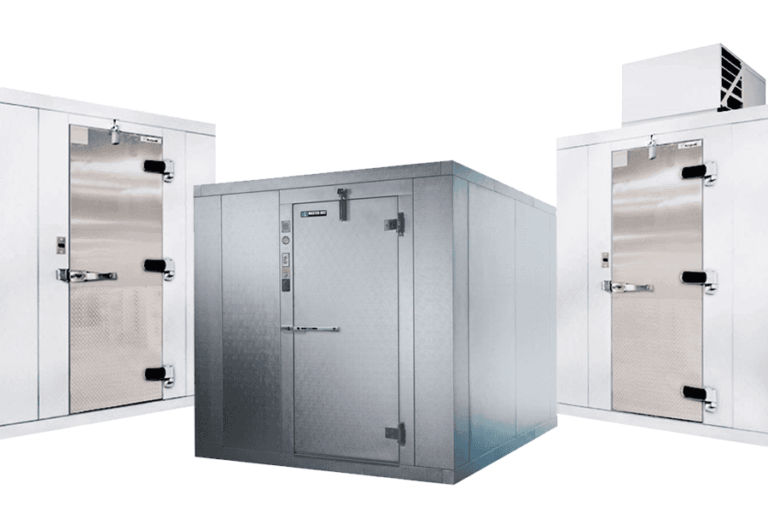1. Refrigerator Not Maintaining Temperature
Inspect the door gasket for tears or gaps that could allow cold air to escape. Clean the seal and the door frame to ensure a tight closure. Replace the seal if necessary.
Ensure the thermostat is set to the correct temperature. If adjusting the thermostat doesn’t change the temperature, the thermostat might need replacing.
Dirty condenser or evaporator coils can impede cooling efficiency. Clean the coils with a coil brush and vacuum any debris.
Make sure there is adequate airflow around the condenser unit, and check for blocked vents inside the refrigerator that could restrict air circulation.
2. Excessive Frost Buildup
Walk-in refrigerators typically have an automatic defrost cycle. If frost is accumulating, the defrost timer, heater, or thermostat could be malfunctioning.
Frequent or prolonged door openings, or a door not sealing properly, can let in humid air, leading to frost. Ensure the door closes securely.
3. Refrigerator Not Running
Verify that the refrigerator is properly plugged in and that there is power to the outlet. Check the circuit breaker or fuse box.
The electronic control board regulates power to the compressor and fans. If the fridge is not running at all, this board could be at fault.
The compressor is the heart of the refrigerator’s cooling system. If it’s not running, the start relay, start capacitor, or the compressor itself might need replacement.
Ensure evaporator and condenser fan motors are working correctly. Faulty fans can prevent proper cooling.
4. Unusual Noises
Loose or damaged fan blades can cause rattling. Inspect and tighten or replace as necessary.
Verify that all internal components and panels are securely fastened. Loose parts can vibrate and make noise.
Worn-out compressor mounts can cause the compressor to make excessive noise. Replace the mounts if they’re damaged.
General Maintenance Tips
Keep coils, fans, and the interior clean to maintain optimal performance.
Regularly inspect and clean door seals to ensure they are airtight.
Have thermostats and sensors calibrated periodically by a professional to ensure accurate temperature control.
While some issues can be resolved with basic troubleshooting and minor repairs, more complex problems, especially those related to the refrigeration cycle (like compressor or refrigerant issues), typically require professional expertise. Additionally, handling refrigerants must comply with environmental regulations and often requires certification.
If after basic troubleshooting the issue persists, or if you’re not comfortable performing any of the steps, it’s best to consult with a professional refrigeration technician. They can diagnose and resolve issues more accurately, ensuring your walk-in refrigerator operates efficiently and safely.
- Published on







